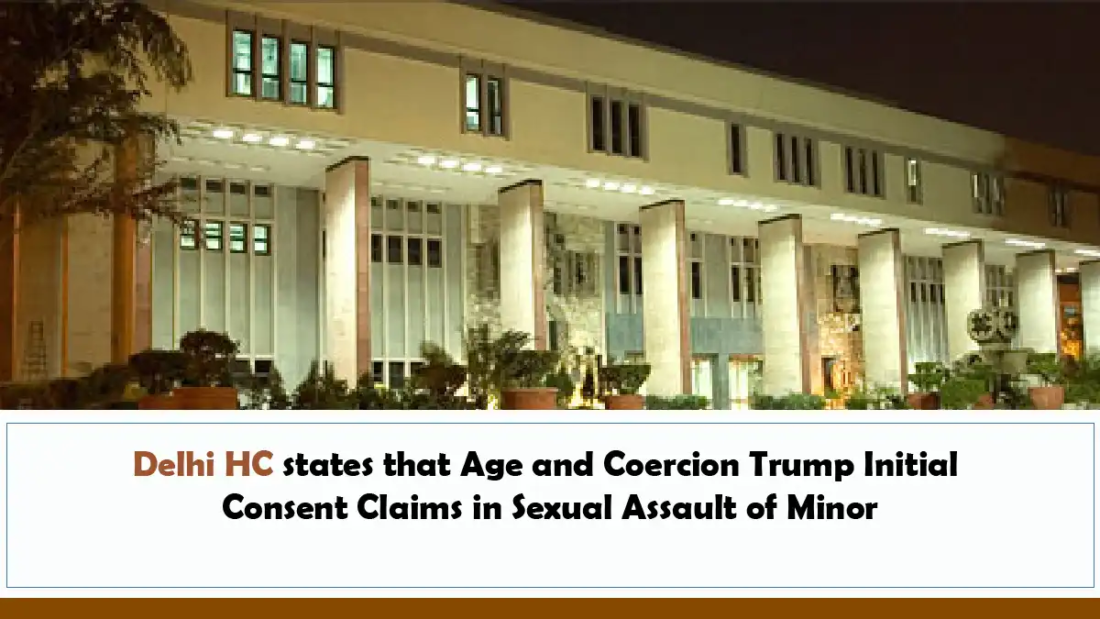Facts of the Case
The case arose from a complaint lodged by the father of a 14-year-old girl, reporting her missing on 5th March 2017. It was suspected that she had been enticed away by unknown persons. Investigation revealed that the minor was residing with the 21-year-old accused in Farukhabad, Uttar Pradesh. The minor was medically examined, and initial statements indicated that she was in love with the accused, had voluntarily left home, and had married him. However, a subsequent statement recorded under Section 164 Cr.P.C. revealed that she had been forcibly taken and subjected to sexual intercourse against her will. She was placed under the care of the Child Welfare Committee and later disclosed that she was pregnant. The foetal remains were seized following a medical termination. A chargesheet was filed against the accused under Sections 363, 366, and 376(2)(n) of the IPC, and Sections 5(l) and 6 of the POCSO Act. The trial court convicted the accused and sentenced him to rigorous imprisonment, along with fines and compensation to the victim.
Contentions of the Petitioner (Accused)
The accused challenged his conviction, claiming that the minor’s statements were inconsistent. He argued that her initial statements under Section 161 Cr.P.C. and the medical examination suggested consensual relations, and that she had voluntarily accompanied him. He further contended that the Prosecution failed to prove her age conclusively, noting that the school records presented were not corroborated by a birth certificate or photographs, thus undermining the applicability of statutory presumptions under the POCSO Act. He also pointed out a delay in filing the FIR, absence of independent witnesses from Farukhabad, and inconclusive forensic evidence linking him to the pregnancy. Additionally, he claimed that the trial court erred in awarding a disproportionate sentence without considering mitigating circumstances such as the alleged consensual nature of the relationship and absence of prior criminal history.
Contentions of the Respondent (State/Prosecution)
The State and the victim’s counsel argued that the Prosecutrix’s testimony was clear, cogent, and of sterling quality. They submitted that minor inconsistencies in her statements did not diminish the core allegation of sexual assault. They emphasised that consent is immaterial in cases involving a minor. The Prosecution established her age through school records, invoking statutory presumptions under Sections 29 and 30 of the POCSO Act, which shifted the burden onto the accused to rebut. They contended that the accused had forcibly taken the minor from her lawful guardianship, transported her to Farukhabad, and engaged in repeated sexual intercourse. The victim’s pregnancy was confirmed through medical records, which corroborated her testimony. The procedural lapse regarding the foetal sample did not undermine the Prosecution’s case, as the pregnancy itself was established.
Court’s Observations
The Delhi High Court upheld the trial court’s conviction. The Court observed that, “even if the Prosecutrix did not characterise the sexual acts as forcible in her earliest accounts, or even described them as consensual in her MLC, such statements do not exculpate the accused.” The Court emphasised the statutory framework of the POCSO Act and the legal irrelevance of alleged consent by a minor, noting that the disparity in age and maturity increased the risk of manipulation, which the Act is designed to prevent. It relied on the Supreme Court’s guidance regarding child witnesses, stating that the “the evidence of a child witness for all purposes is deemed to be on the same footing as any other witness…while appreciating the testimony of a child witness the courts are required to assess whether the evidence of such witness is its voluntary expression and not borne out of the influence of others and whether the testimony inspires confidence.” The Court found the victim’s testimony consistent and credible despite minor discrepancies, reinforced by medical evidence of pregnancy. On kidnapping and abduction charges, it held that “Once her minority is established, her ostensible willingness or professed affection becomes immaterial in law, for a minor is incapable of consenting to her removal from lawful guardianship.” The Court also noted that absence of injuries, procedural lapses in forensic examination, or lack of independent witnesses did not undermine the conviction, given the coherent and corroborated testimony of the minor.
Court’s Order
The Delhi High Court dismissed the appeal of the accused and upheld the trial court’s conviction under Sections 363, 366, and 376(2)(n) of the IPC, and Section 5(l) of the POCSO Act. The sentence of 10 years rigorous imprisonment under Section 6 of POCSO, along with fines and default sentences, was confirmed to run concurrently. The Court also directed the Delhi State Legal Services Authority to facilitate disbursement of the Rs. 7 lakh compensation awarded to the minor victim by the trial court.
Written by Adv. Deeksha Rai
 Cart is empty
Cart is empty 

